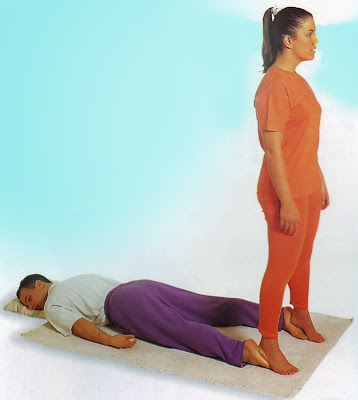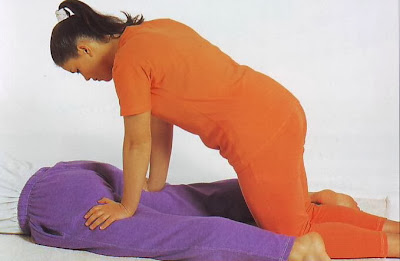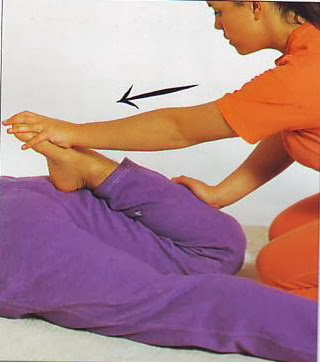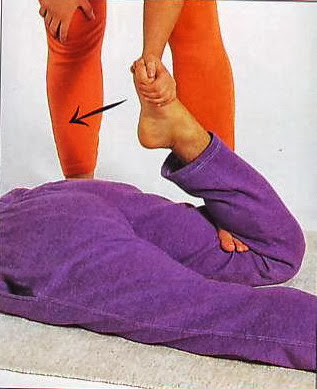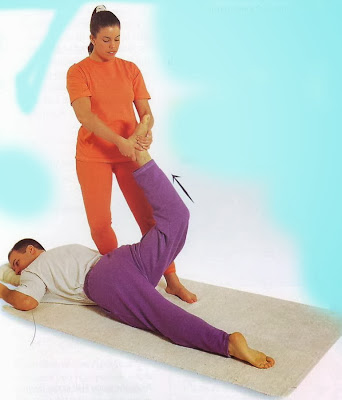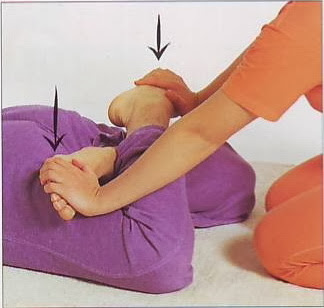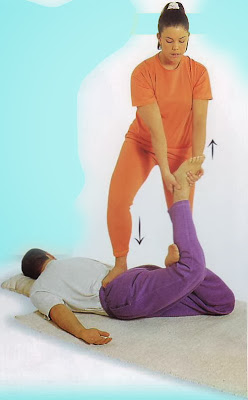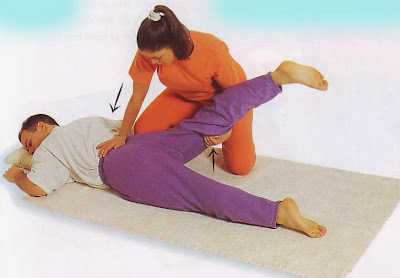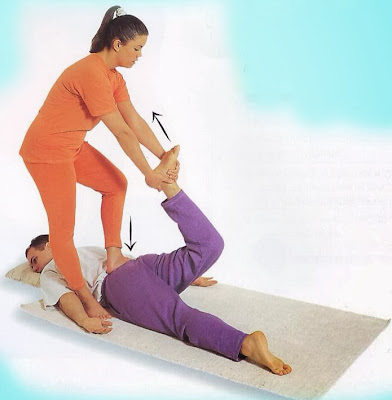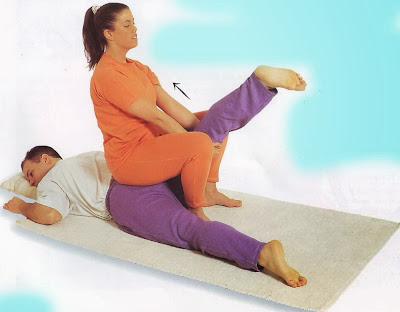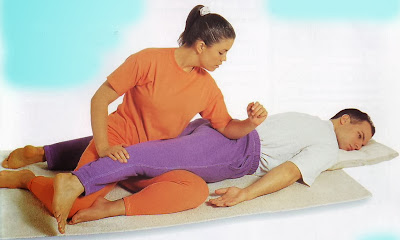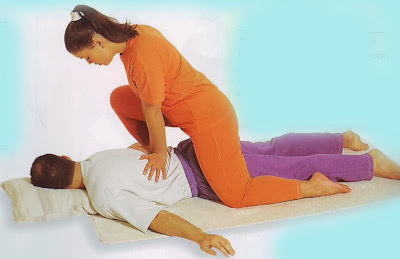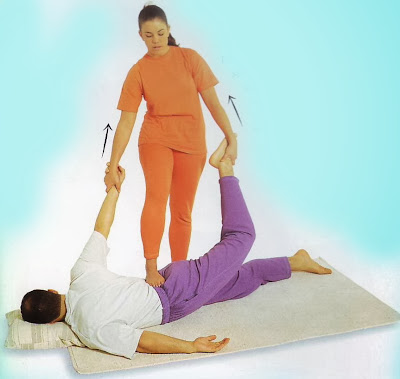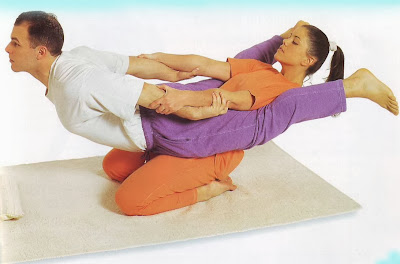The ultimate energy
balance throughout the body can only be achieved by pressing the energy
channels on either side of the spine. Energy flow in this area affects all the
organ systems and the overall health and well-being of the body. The powerful
manipulations demonstrated in this lesson will strengthen the spine and help to
treat all kinds of back problems.
Sen channels on the back
There are two lines on each
side of the spine. The inner one is about two finger-widths and the outer line
four finger-widths from the midline of the spine. This is l - Chinese Bladder
meridian.
In Chinese theory the Bladder meridian starts on the eye and
ends on the outer edge of the little toe in one continuous energy channel. In
Thai bodywork, pressing is done from the feet up to the buttocks. l - starts between
the ankle bone and the Achilles tendon, then runs up the midline of the back of
the leg.
1. STANDING FEET TO FEET PRESS
Balancing your weight on
your toes, lean backwards to press your heels into the soles of your partner’s
feet. Use a gentle to-and-fro rocking motion with your feet. (Note: make sure
you have adequate padding beneath his feet for this exercise.)

- Aids flexibility of the
foot and improves blood flow as the metatarsal bones are splayed apart.
2. PRESSING THE BACK OF THE
LEGS & BUTTOCKS
Touch Method One: Palmar
and Thumb Pressing Assume a kneeling position and palmar press several
times up both your partner’s legs simultaneously from the ankles to the lower
margin of the buttocks. Now press with your thumbs up the center Sen channels
of the legs. Repeat once or twice.
Touch Method Two: Butterfly
Pressing Butterfly press up each leg in turn several times.

- Improves blood and lymph
circulation and also release myofascial adhesions.
Do not use the deep palming
or thumbing method on areas with obvious varicose veins.

- 1. STANDING FEET TO FEET PRESS
Pressed: All intrinsic muscles of
the feet
- 2. PRESSING THE BACK OF THE LEGS &
BUTTOCKS
Pressed: Gastrocnemius, soleus,
hamstrings
3. PRESSING HEEL TO BUTTOCK
Press your partner’s right
foot back as far towards the buttocks as is comfortable. At the same time, use
the heel of your right palm to press along the Sen which lies just outside the
margin of the tibia (shin bone).

- Eases pain and tension in
tight and spasming quadriceps; improves ankle and knee mobility.
4. PRESSING THE THIGH &
PULLING THE FOOT
Grasp your partner’s foot with both hands and place your
right foot across the back of his thigh, close to the knee crease. Pull the
lower leg vertically upwards and hold for a few seconds. Move your foot to
different positions up the thigh between each vertical pull.

- Eases sciatic pain and
relieves pain and tension in the hamstring muscles; aids ankle flexibility and
stimulates the Sen channels.
5. FOOT CRACKER
Still standing, tuck your left foot in snugly behind your
partner’s right knee and press his foot down towards his buttock.

- Improves mobility of the
ankle and knee joints; eases tension and spasming in calves and hamstrings.
6. STANDING BACKWARD LEG LIFT
Facing your partner’s feet,
grasp his right ankle and then lift his leg backwards as far as is comfortable.
Now repeat Techniques 3 – 6 on the other leg.

- Eases lower back and hip
pain, and sciatica.
7. PRESSING FEET TO BUTTOCK
Touch Method One:
Press both your partner’s feet down towards his buttocks and simultaneously
pull down on the balls of his feet.
Touch Method Two:
Cross your partner’s legs and press both his feet down to his buttocks. Recross
his legs in the opposite way and then repeat.

- Increases mobility of the
feet, ankles and knees.

- 3. PRESSING HEEL TO BUTTOCK
Stretched: Tibialis anterior, quadriceps,
foot flexors
- 4. PRESSING THE THIGH & PULLING THE
FOOT
Stretched: Tibialis anterior, foot
flexors
Pressed: Hamstrings
Stretched: Tibialis anterior,
quadriceps, foot flexors
Pressed: Hamstrings, gastrocnemius
- 6. STANDING BACKWARD LEG LIFT
Stretched: Iliacus, psoas major,
quadriceps, Sartorius
- 7. PRESSING FEET TO BUTTOCK
Stretched: Anterior tibialis,
quadriceps, foot flexors, soleus
8. REVERSE HALF LOTUS PRESS
Bend your partner’s right leg into the Half Lotus position so
that the top of his foot lies across his left thing just behind the knee
crease. Now palm and thumb walk along the outer Sen of the flexed leg.

- Improves energy flow
through the knees and thighs.
9. REVERSE HALF LOTUS LEG FLEX
From the same Half Lotus position, grasp your partner’s left
foot, as shown, and push it down towards his buttock. Then with each push
forward simultaneously press his other thigh.

- Stimulates blood flow and
lymphatic drainage, and treats painful and spasming hamstrings and sciatica.
10. REVERSE HALF LOTUS LEG LIFT
Retaining
the Half Lotus position of the legs, grasp your partner’s left foot with both
hands and stand up. Place your right foot carefully across his lower lumbar
area and lean in on it without using your full body weight as you lift his leg.

- Improves flexibility in the
hip and knee joints. Treats chronic pain in the ilio-sacral region.
Only with a highly flexible partner will you be able to
lift his leg to anywhere near the vertical position.
11. KNEE TO BUTTOCK/BACK BACKWARD LEG LIFT
Touch Method One:
Place your right knee into your partner’s right buttock and lift his leg with
your hand just above the knee. Use your knee as the pivot against which to lift
his leg.
Touch Method Two:
With your right hand across your partner’s lower lumbar area, lift his right
flexed leg against the pressure of your hand.

- Helps those who suffer from
lumbar and hip pain, and sciatica.

- 8. REVERSE HALF
LOTUS PRESS
Pressed: Hamstring, vastus
lateralis, gastrocnemius, peroneus longus
- 9. REVERSE HALF LOTUS LEG FLEX
Stretched: Tibialis anterior,
quadriceps, psoas major, adductors, Sartorius
Pressed: Hamstrings, vastus
lateralis
- 10. REVERSE HALF LOTUS LEG LIFT
Stretched: Psoas major,
quadriceps, iliacus
Pressed: Sacrospinalis
- 11. KNEE OR HAND TO BUTTOCK/BACK LEG
LIFT
Stretched: Gracilis, quadriceps
Pressed: gluteus maximus
12. FOOT TO BUTTOCK/BACK
BACKWARD LEG LIFT
Hold your partner’s right foot with both hands and lift his
leg. Now place your left foot across his lower lumbar area and lean back to
pull the leg against pressure from the foot.
13. BACKWARD SEESAW LEG LIFT
Sit
lightly on your partner’s buttocks, taking most of your weight on your feet.
Grasp his right knee underneath and, with both hands, lift his leg towards you
as far as it will comfortably go without causing pain. Hold for at least ten
seconds.

- Eases tension and pain in front of the thigh, and helps sciatica and lower back pain.
14. INTIMATE CALF & THIGH
PRESS
With
your partner’s right leg over your legs, sit between his thighs. Use your
forearms to press along his thigh and calf simultaneously from ankle to
buttock. Repeat.
Then lean in carefully with your elbow and knead the entire
buttock area. Then repeat Exercise 8-14 on the other leg.

- Treats sciatica and lower
back pain and relaxes tense muscles in the leg.

- 12. FOOT TO BUTTOCK/BACK BACKWARD LEG LIFT
Stretched: Iliacus, psoas major,
quadriceps
Pressed: Gluteus maximus, sacrospinalis
- 13. BACKWARD SEESAW LEG LIFT
Stretched: Psoas major, iliacus,
quadriceps, Sartorius
Pressed: Gluteus maximus
- 14. INTIMATE CALF & THIGH PRESS
Stretched: Gluteus, biceps femoris,
vastus lateralis
Pressed: Gluteus, biceps femoris,
vastus lateralis
15. PRESSING THE BACK FROM A
KNEELING POSITION
Touch Method One: Palmar
Presing Kneel on one leg astride your partner. With your palm heels on
either side of his spine and fingers directed outwards, use both hands to palm
deeply and very slowly up and down the Sen of his back between the sacro-lumbar
and upper thoracic regions, as shown. Keep your arms straight at all times and
use your body weight to generate the required pressure. Finish off by palming
his arms.
Touch Method Two: Thumb
Pressing Use both your thumbs simultaneously to press the first Sen
channels of your partner’s back, which are located about 2 cm (3/4 in) from his
spine on both sides.
Touch Method Three:
This is a variation on Touch Method One where you kneel on the back of the
thighs just below the buttocks to palmar or thumb press the whole back.
- Stimulates energy flow
through the back. Releases tense and fibrotic fascia around back muscles and
eases lumbago, sciatica and pain due to slipped disc.
Exercise care when carrying
out the Cobra exercises. There be should be no trace of jerkiness in the
movements as these must, at all times, be smoothly executed for reasons of
safety.
Many people will experience real discomfort if you attempt to
raise their shoulders more than an inch or so from the mat. This stretch should
only be performed on those who are fit and fairly flexible. Do not attempt any
of the Cobra techniques on partners heavier than yourself, on the elderly or
those with intervertebral disc problems.
16. KNEELLING CUSHION COBRA
Kneeling on your partner’s thighs, grasp his
wrists and ask him to grasp your own wrists. Lean back to use your weight to
lift his upper body into a Cobra position. Hold for at least ten seconds.
Modern living provides few opportunities for backward flexion
of the spine. To ensure that your partner’s spine remains health and pain-free,
you must do both forward and backward flexions.
 Pressed: Erector spinae, trapezius,
rhomboideus minor & major, quadratus lumborum
Pressed: Erector spinae, trapezius,
rhomboideus minor & major, quadratus lumborum
- 16. KNEELING CUSHION COBRA
Pressed: Hamstrings
Stretched: Pectoralis mafor,
deltoids, rectus abdoninis, psoas, iliacus, serratus anterior
17. SITTING STOOL COBRA
Touch Method One:
Flex your partner’s lower legs 90˚ so that the soles of his feet are pointing
upwards. Sit down carefully on his feet and support your main body weight on
your own feet. Palm press the back as described in Exercise 15. Lift his arms
back and place his wrists across the tops of your thighs. Bend forward and
place your hands under the front of his shoulders and lift them from the mat
using your body weight as you lean backwards. Hold for thirty seconds. Then
repeat twice.
Touch Method Two:
This time your partner interlocks his hands behind his head. Repeat the lift,
holding his shoulders as in Touch Method One or under the armpits.
18. STANDING COBRA
Considerable balance is needed to perform this technique
correctly. Stand on your partner with one foot placed on each of his thighs.
Your toes should be directed to point outwards and the arches of your feet
should cover the lower margin of his buttocks. Lean forward, grasp his wrists
and he yours simultaneously and, with your arms straight, leans backwards so
that your weight is pivoted onto your feet. Now lift him into a Cobra position.
The ability to tolerate backward flexion of the spine varies greatly so much
care must be taken on the first lift to determine how far you can go. Each lift
should be sustained for up to thirty seconds. Repeat twice.

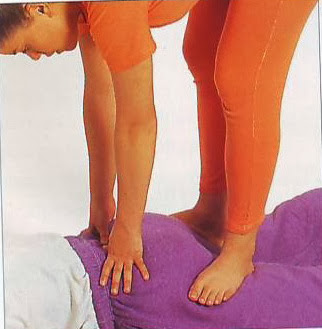

- Strong, sustained backward
flexion exercises the articulating joints and associated muscles between the
vertebrae, particularly the lumbar ones. Spinal mobility and flexibility is
improved, tension and pain in the lower back and between the shoulder blades is
eased, and increased shoulder mobility results. Energy flow in the Sen channels
of the back increases.
Many people will experience
real discomfort if you attempt to raise their shoulders more than an inch or so
from the mat. This stretch should only be performed on those who are reasonably
flexible. Do not attempt any of the Cobra techniques on partners heavies than
yourself, on the elderly or those with intervertebral disc problems.
 Pressed: Hamstrings
Stretched: Pectoralis major, deltoids, teres major, rectus abdominis, psoas major, iliacus, trapezius, infraspinatus, supraspinatus, serratus anterior
Pressed: Hamstrings
Stretched: Pectoralis major, deltoids, teres major, rectus abdominis, psoas major, iliacus, trapezius, infraspinatus, supraspinatus, serratus anterior
19. WHEELBARROW
Grasp your partner’s ankles and lift his legs whilst, at the
same time, positioning one foot over his sacrum and your toes just touching his
lower lumbar area. Apply light pressure only. Give the maximum lift that will
stretch the front of his thighs effectively without causing discomfort. Hold
this position for about thirty seconds.

- This technique gives the
hip joints a rather grater backward rotation than they would normally
experience. It aids hip mobility and helps to relieves sciatic pain.
20. CROSSED AND LATERAL SCISSOR
STRETCHES
The methods used for these stretches are identical to those
used for the Crossed and Lateral Scissor Stretches with your partner on his
side with one small exception: your foot is positioned across his lower spine.
Repeat on the other side.

- As for Crossed and Lateral
Scissor Stretches in the side position.
21. KNEE TO CALF PRESS
Sit on your partner’s sacrum or lumbar region. The exact
position is determined by the requirement that your knees should be able to
press into his calf muscles. Grasp the front of his ankles and lift them
towards you, positioning your knees so that his calf muscles are pulled against
them.

- Relaxes spasming calf
muscles and improves energy flow in the lower leg.
22. INTIMATE COBRA
Kneel and slide between your partner’s thighs, lifting them
as you go so that they come to lie across the front of your hips. Grasp his
arms just above the elbow and have him grasp your forearms. Lean back with your
body weight to lift him into the Cobra position. Hold for at least ten seconds.
 Stretched: Psoas, iliacus,
Sartorius, rectus femoris
Stretched: Psoas, iliacus,
Sartorius, rectus femoris
- 20. CROSSED & LATERAL SCISSOR
STRETCHES
Stetched: Pectoralis major,
Sartorius, psoas major, iliacus
Pressed: Erector spinae
Stretched: Quadriceps, psoas
Pressed: Gastrocnemius, soleus
Stretched: Psoas, iliacus, supra-
& infraspinatus, serratus anterior, pectoralis major, deltoids, rectus abdominis

























